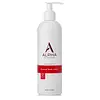What's inside
What's inside
 Key Ingredients
Key Ingredients

 Benefits
Benefits

 Concerns
Concerns

 Ingredients Side-by-side
Ingredients Side-by-side

Water
Skin ConditioningPetrolatum
EmollientGlycolic Acid
BufferingGlycerin
HumectantAmmonium Hydroxide
BufferingStearic Acid
CleansingDimethicone
EmollientParaffinum Liquidum
EmollientCetyl Alcohol
EmollientGlyceryl Stearate
EmollientPEG-100 Stearate
Lanolin Alcohol
EmollientPEG-40 Stearate
EmulsifyingSorbitan Stearate
EmulsifyingPropylene Glycol
HumectantDiazolidinyl Urea
PreservativeIodopropynyl Butylcarbamate
PreservativeWater
Skin ConditioningHydroxyethyl Urea
HumectantButyrospermum Parkii Butter Extract
Skin ConditioningDimethicone
EmollientGlycerin
HumectantStearyl Alcohol
EmollientNiacinamide
SmoothingSelaginella Lepidophylla Extract
EmollientSteareth-21
CleansingGlyceryl Stearate
EmollientCetyl Alcohol
EmollientJojoba Esters
EmollientJojoba Oil/Macadamia Seed Oil Esters
Skin ConditioningSqualene
EmollientPhytosteryl Macadamiate
Skin ConditioningPhytosterols
Skin ConditioningTocopherol
AntioxidantRetinol
Skin ConditioningCetearyl Alcohol
EmollientCaprylic/Capric Triglyceride
MaskingSodium Ascorbate
AntioxidantPalmitoyl Hexapeptide-12
Skin ConditioningPolysorbate 60
EmulsifyingCitrullus Lanatus Fruit Extract
Skin ConditioningPyrus Malus Fruit Extract
Skin ConditioningLens Esculenta Fruit Extract
Skin ConditioningSodium Lactate
BufferingSodium PCA
HumectantPropylene Glycol
HumectantHydroxyacetophenone
AntioxidantTheobroma Cacao Seed Butter
EmollientBehentrimonium Methosulfate
Stearamidopropyl Pg-Dimonium Chloride Phosphate
Butylene Glycol
HumectantPolyacrylate Crosspolymer-6
Emulsion StabilisingEthylhexylglycerin
Skin ConditioningGuar Hydroxypropyltrimonium Chloride
Skin ConditioningPanthenol
Skin ConditioningDisodium EDTA
Citric Acid
BufferingC12-15 Alkyl Benzoate
AntimicrobialTribehenin
EmollientCeramide Ng
Skin ConditioningPEG-10 Phytosterol
EmulsifyingCaramel
Cosmetic ColorantWater, Hydroxyethyl Urea, Butyrospermum Parkii Butter Extract, Dimethicone, Glycerin, Stearyl Alcohol, Niacinamide, Selaginella Lepidophylla Extract, Steareth-21, Glyceryl Stearate, Cetyl Alcohol, Jojoba Esters, Jojoba Oil/Macadamia Seed Oil Esters, Squalene, Phytosteryl Macadamiate, Phytosterols, Tocopherol, Retinol, Cetearyl Alcohol, Caprylic/Capric Triglyceride, Sodium Ascorbate, Palmitoyl Hexapeptide-12, Polysorbate 60, Citrullus Lanatus Fruit Extract, Pyrus Malus Fruit Extract, Lens Esculenta Fruit Extract, Sodium Lactate, Sodium PCA, Propylene Glycol, Hydroxyacetophenone, Theobroma Cacao Seed Butter, Behentrimonium Methosulfate, Stearamidopropyl Pg-Dimonium Chloride Phosphate, Butylene Glycol, Polyacrylate Crosspolymer-6, Ethylhexylglycerin, Guar Hydroxypropyltrimonium Chloride, Panthenol, Disodium EDTA, Citric Acid, C12-15 Alkyl Benzoate, Tribehenin, Ceramide Ng, PEG-10 Phytosterol, Caramel
 Reviews
Reviews

Ingredients Explained
These ingredients are found in both products.
Ingredients higher up in an ingredient list are typically present in a larger amount.
Cetyl Alcohol is a fatty alcohol. Fatty Alcohols are most often used as an emollient or to thicken a product.
Its main roles are:
Though it has "alcohol" in the name, it is not related to denatured alcohol or ethyl alcohol.
The FDA allows products labeled "alcohol-free" to have fatty alcohols.
Learn more about Cetyl AlcoholDimethicone is a type of synthetic silicone created from natural materials such as quartz.
What it does:
Dimethicone comes in different viscosities:
Depending on the viscosity, dimethicone has different properties.
Ingredients lists don't always show which type is used, so we recommend reaching out to the brand if you have questions about the viscosity.
This ingredient is unlikely to cause irritation because it does not get absorbed into skin. However, people with silicone allergies should be careful about using this ingredient.
Note: Dimethicone may contribute to pilling. This is because it is not oil or water soluble, so pilling may occur when layered with products. When mixed with heavy oils in a formula, the outcome is also quite greasy.
Learn more about DimethiconeGlycerin is already naturally found in your skin. It helps moisturize and protect your skin.
A study from 2016 found glycerin to be more effective as a humectant than AHAs and hyaluronic acid.
As a humectant, it helps the skin stay hydrated by pulling moisture to your skin. The low molecular weight of glycerin allows it to pull moisture into the deeper layers of your skin.
Hydrated skin improves your skin barrier; Your skin barrier helps protect against irritants and bacteria.
Glycerin has also been found to have antimicrobial and antiviral properties. Due to these properties, glycerin is often used in wound and burn treatments.
In cosmetics, glycerin is usually derived from plants such as soybean or palm. However, it can also be sourced from animals, such as tallow or animal fat.
This ingredient is organic, colorless, odorless, and non-toxic.
Glycerin is the name for this ingredient in American English. British English uses Glycerol/Glycerine.
Learn more about GlycerinGlyceryl Stearate is a mix of glycerin and stearic acid.
It is used to stabilize the mixing of water and oil ingredients. By preventing these ingredients from separating, it can help elongate shelf life. It can also help thicken the product's texture.
As an emollient, it helps soften skin and supports barrier-replenishing ingredients.
In cosmetics, Glyceryl Stearate is often made from vegetable oils or synthetically produced.
This ingredient may not be fungal-acne safe
Fun fact: The human body also creates Glyceryl Stearate naturally.
Learn more about Glyceryl StearatePropylene Glycol is an odorless, colorless liquid. As a humectant, it helps skin retain moisture. It also aids in delivering active ingredients.
Another role of this ingredient is preventing a product from melting or freezing. Propylene glycol also adds antimicrobrial properties to a product, elongating product lifespan.
This ingredient is considered an organic alcohol and commonly added into both cosmetics and foods.
Those with sensitive skin or conditions may develop a rash when using this ingredient.
Learn more about Propylene GlycolWater. It's the most common cosmetic ingredient of all. You'll usually see it at the top of ingredient lists, meaning that it makes up the largest part of the product.
So why is it so popular? Water most often acts as a solvent - this means that it helps dissolve other ingredients into the formulation.
You'll also recognize water as that liquid we all need to stay alive. If you see this, drink a glass of water. Stay hydrated!
Learn more about Water